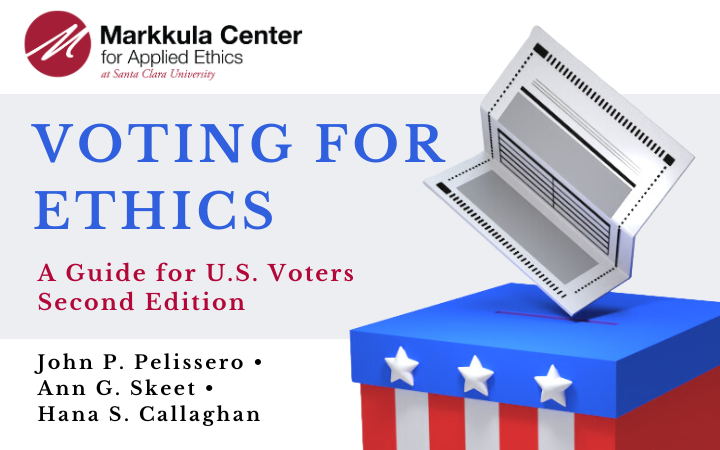Leadership Ethics
The Markkula Center for Applied Ethics explores ethical issues in organizational leadership such as corporate governance, role-based ethics and tone at the top. We also address questions of personal ethical leadership.

Voting for Ethics: A Guide for U.S. Voters
“Voting for Ethics” is a non-partisan, how-to guide for U.S. voters. It will help you identify the hallmarks of an ethical candidate and make a more informed decision -- whether for your local school board or a national election.
Resources for Leaders Managing Corporate Culture
A collection of articles sharing research and practical approaches to addressing the ethical challenges inherent in creating diverse, anti-racist, inclusive organizations. We help managers understand what they need to do to create the kind of culture built on values, void of toxicity, and viable for the diversity represented in today's workforce.


Evaluating Culture for Ethics
Culture Self-Assessment Practice recommends approaches to evaluating culture for ethics within companies and other types of organizations. The materials are primarily for members of an organization’s leadership team, including human resources and legal, but designed to engage a cross-section of leaders from various disciplines.
Articles
Leadership Ethics articles on corporate governance, ethical reasoning, diversity, mission and values, and culture.
Case Studies
Case studies on leadership ethics issues faced by organizations such as Apple, Starbucks, and Wells Fargo.
Customize Your Mission
A mission statement serves as a standard for ethical decision-making to guide individuals and organizations.
Workplace Diversity Dialogues
Diversity and inclusion problems in Silicon Valley organizations are solvable if the issues are considered as ethical dilemmas. Find resources, articles, videos, and blog posts about diversity and inclusion here.
Teaching Note: Interview of Theranos Whistleblower, Tyler Shultz
This teaching module for business ethics, leadership and management courses includes two videos, homework assignments, and class discussion, all designed to spark conversation about ethical issues associated with whistleblowers and corporate governance.

Across races from Georgia to New York, deepfakes are steering political narratives and voter perception.

The current state of immigration in America reflects a systemic failure and only attention to addressing these long-term failures will set it on its correct path.

Though much has been written in recent weeks about the hallmarks of the second Trump administration, little has been written about the absence of care—an overarching feature of this presidency’s first months in office.

Are Trump’s tariffs ethical? Tariffs fail justice due to their inequities. They use people as a means to an end and erode the United States’ global standing.

Davina Hurt, director, government ethics and Ann Skeet, senior director, leadership ethics, published by Salon.

Ann Skeet, senior director, leadership ethics, quoted by Reworked.

Ann Skeet, senior director, leadership ethics, quoted by NBC Bay Area.

Ann Skeet, senior director, leadership ethics, quoted by Forbes.
A Model for Leadership Ethics
Leadership ethics explores the relationships between leaders and followers and provides tools for those in leadership roles to bring ethics forward in organizations. Ann Skeet, senior director of leadership ethics, has developed a leadership model that encourages users to think of their leadership as a practice. It shows how leadership happens on a continuum from the personal to the formal, building from a leader’s character and including actions the leader takes, with elements combining to render the impact the leader has.
What Is Leadership Ethics?
Leadership ethics looks at the issues people face when they're in formal leadership roles. It can also be about personal leadership—people’s character and values and how they “show up” in life, which is central to the way they are able to have an impact as leaders.

Resources for Leaders During the COVID-19 Pandemic
A collection of articles addressing the compelling ethical issues that businesses and leaders are facing today.
Leadership and Business Ethics Council
As ethical issues in business and leadership are increasingly relevant to today’s climate this team of professionals from public, private, and nonprofit sectors collaborates with the Ethics Center to identify and prioritize complex issues.
